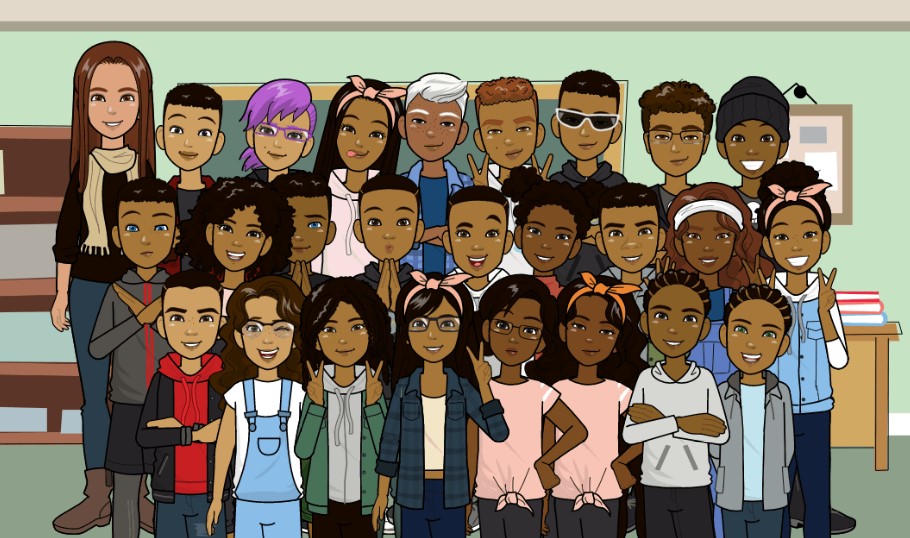How to Use SEL Tools to Help Students Transition Back to In-Person Learning
Using SEL tools, from comic contests to mindfulness classes, to help kids readjust to the social aspects of school

Toby Farms Intermediate School, where I work as the school counselor, is located in a city with one of the highest crime rates in the nation. In this sort of urban setting, social-emotional learning (SEL) is extremely important. When you're in an urban setting, you have students who are experiencing higher levels of trauma, so they might become a little bit more reactive to situations. For example, if one kid is walking down the hallway and bumps into another kid, they may perceive that as a threat.
Students who are constantly engaged in the “fight or flight” mentality are more likely to interpret those small stressors as attacks, and SEL helps them engage in behaviors that are conducive to building and maintaining relationships. We’re especially focused on these behaviors right now as we are making our transition from remote to in-person learning. Our kids are excited to be back, but they haven't been sitting in a classroom for months—they've been sitting in their bed or at their kitchen table.
Here are the SEL tools and tactics we’re using to model and support positive behaviors in class.
The Power of Real-World Examples
Our approach to SEL is based on the five domains laid out by CASEL:
- Relationship skills
- Responsible decision-making
- Self awareness
- Self management
- Social awareness
To keep students engaged when I present these ideas, I use real-world examples in which students can see themselves or people they’re familiar with. If we’re talking about responsible decision-making, for instance, we’ll talk about how if you don't turn in your homework, you know your grade will go down. Or if you steal a candy bar from the corner store, you could have the police called on you.
One positive example of responsible decision-making I like to share is the football player Rob Gronkowski. The boys all know who he is, so they really pay attention when I tell them that Gronkowski actually saved all of his career earnings and lives off his endorsement money. He now has more than $54 million.
To really connect with our kids, I like to bring in local speakers who have broken through barriers and demonstrated resilience. I had a local radio personality known as “Cappuccino in the Morning” come and talk to my students about how she went to a historically black college or university (HBCU) and made her way up the East Coast to pursue her dreams. That was a really cool message because a lot of our kids didn't know what HBCUs were and didn’t understand the importance of them. I had a student tell me that she was so excited because she listens to Cappuccino every day. This sort of example is especially powerful because students don’t just see a famous person—they see what they have in common with that individual.
Tools and ideas to transform education. Sign up below.
Reinforcing Concepts through Digital Comics
With SEL, we want students to reflect on what they just learned. Creating their own digital comics using a tool such as Pixton allows them to show understanding of these concepts and also to see themselves represented in stories. I appreciate how inclusive the imagery in Pixton is: It offers people in wheelchairs, and all different skin tones, hair types, and clothes. Seeing someone who looks like yourself in a comic for the first time can be life-changing. To offer this sort of representation and to apply our SEL concepts across the curriculum, our school uses comics in writing, geography, and science classes, too.
One of the first assignments I gave when we returned to in-person learning was asking students to make an online comic based on one of the five SEL domains. I got them started with examples such as, “You could have two people engaging in a light saber fight and ask: ‘Is this responsible decision-making?’” And the answer is “No, we have a zero tolerance policy for violence.”
Through our positive behavioral interventions and supports (PBIS) program, I offered prizes for these comics: first prize was a $20 WAWA gift card, second prize was a $10 WAWA gift card, and third prize was a $5 gift card from either Chick-fil-A, WAWA, or Freddy's.
The Practical Rewards of PBIS
Many of our kids come from lower-income households, so gift cards for food are practical and give them some independence because they can go and buy themselves something to eat. Last year we had an incentive in which every student who made the honor roll got a nice blanket that was donated from Harrah’s Casino. It wasn’t just a reward; it was actually something practical that they and their families could use.
This year, we're asking teachers to submit the names of all students who have been in attendance all week. Then we put those names on a spinner, and the winners get $20 WAWA gift cards. With all of these incentives, we’re telling students, “If you exhibit positive behavior, we want to reward you.”
Mindfulness in Gym Class and Special Education
SEL is everywhere at Toby Farms, including gym class. We have a professional, Ms. Mandel, who comes in and teaches mindfulness. We also work with her and our other teachers to create a list of students who would benefit from one-on-one mindfulness. She sees those students on a weekly basis for 15 to 20 minutes. Having a group and an individual component is an enormous help in a school where I’m the only counselor for 350 students. We do our best to make SEL everyone’s job, and to teach it in ways that will stick with our students.
For example, I recently went into a special education class. I gave everyone a piece of paper and a pen, and said, “All right, I want you to write mean things about this paper.” After they wrote down mean things, I told them they could crumple it up or rip it. So they crumpled it up and ripped it.
And then I said, “Say you're sorry and return that paper back to normal.” But of course they couldn’t. The paper already had nasty messages written on it and it was destroyed. I told them, “That's exactly how it works when you say hurtful things to somebody: just because you say you're sorry, doesn't take it away.” This sort of hands-on lesson, in which they do things with their own hands and see the consequences, is really powerful for our students.
Kat Keefer is the school counselor at Toby Farms Intermediate School in Brookhaven, Pennsylvania.
